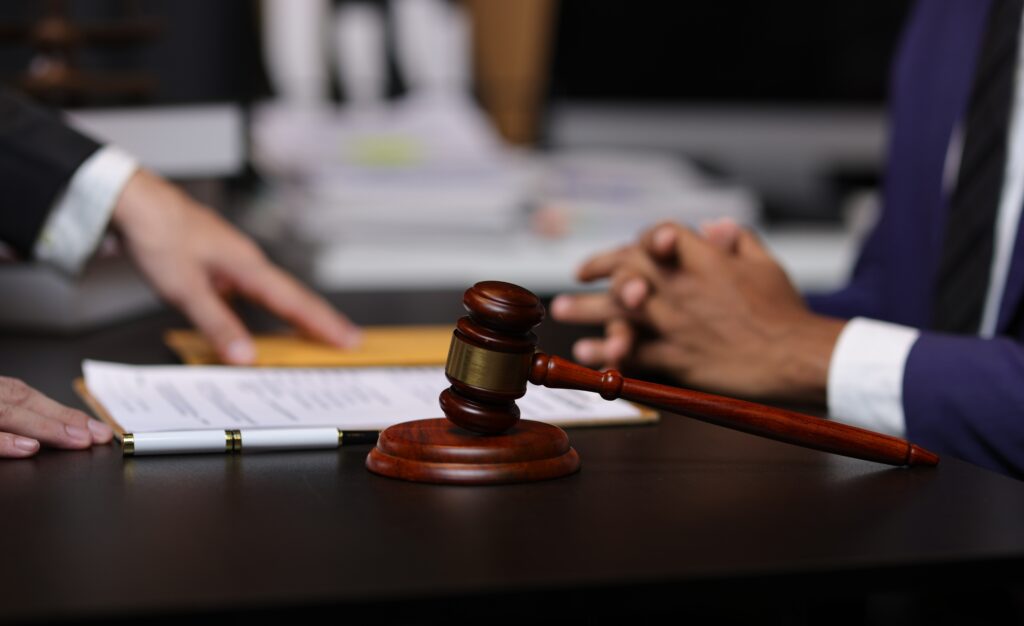Going to court after a trucking accident can be a daunting experience, especially when dealing with the physical and emotional aftermath of such a traumatic event. Feeling overwhelmed, angry, and frustrated is natural, but seeking legal guidance can guide you through this challenging process. A knowledgeable truck accident attorney can provide you with the support and experience needed to build a strong case and protect your rights. Contacting an attorney near you can be the first step toward getting the justice and compensation you deserve. They can guide you through the legal intricacies, gather evidence, and fight for your rights in court. Remember, you don't have to face this alone – seek legal help today.
Reach Out Today!
Why Trucking Accident Cases Go to Court
Severity of Trucking Accidents
Trucking accidents are often catastrophic, resulting in severe injuries or even fatalities. Commercial trucks' immense size and weight can cause devastating damage on impact. Given the severity of these accidents, it's not surprising that many end up in court. Victims' damages and losses are often significant, necessitating legal action to pursue fair compensation.
Disputes Over Liability
One of the primary reasons trucking accident cases go to court is the disagreement over liability. Multiple parties, including drivers, trucking companies, manufacturers, and third-party contractors, can contribute to the cause of an accident. Each party may have complex legal relationships and corresponding duties, making determining who is at fault difficult. Trucking companies and insurers may shift blame onto others to minimize liability. Resolving these disputes often requires the intervention of a court to establish fault and determine appropriate compensation.
Low Settlement Offers
Another factor that leads to trucking accident cases going to court is the practice of insurance companies offering low settlement amounts. Insurance adjusters may attempt to close a case quickly by providing inadequate settlements, hoping the victims will accept these offers out of desperation. However, these settlements may not fully cover the extensive medical bills, lost earnings, and other damages suffered by the victims. In such cases, pursuing litigation becomes necessary to seek fair compensation for the injuries and losses sustained.
The Legal Process After a Trucking Accident

Step 1: Filing a Claim
The first step in the legal process after a trucking accident is filing a claim with the at-fault party's insurance company. This involves submitting a demand letter detailing the accident, injuries sustained, and the damages incurred. Gathering evidence early on to support your claim, such as accident scene photos, witness statements, and medical records, is essential. When you hire a truck accident attorney, they will gather this evidence on your behalf.
Step 2: Pre-Litigation Negotiations
After filing a claim, pre-litigation negotiations with the insurance company will begin. This stage involves discussions and negotiations to reach a settlement agreement. The victim and their attorney will assess the initial settlement offers and decide whether they adequately compensate for the injuries and damages. If the offers are insufficient, rejecting them and proceeding to litigation may be the next step.
Step 3: Filing a Lawsuit
If pre-litigation negotiations do not result in a fair settlement, the next step is filing a lawsuit. This involves preparing and submitting legal documents to the court, outlining the details of the accident, the injuries sustained, and the damages sought. Adhering to the statute of limitations, which varies by jurisdiction, you must file the lawsuit within the prescribed time frame to ensure it is valid.
Step 4: Discovery Process
After you file a lawsuit, both parties engage in the discovery process. This involves gathering and exchanging evidence, such as depositions, interrogatories, and subpoenas. Expert witnesses, such as accident reconstruction specialists, medical professionals, and vocationalists, may be called to testify and strengthen the case.
Step 5: Mediation or Settlement Discussions
There may be opportunities for mediation or settlement discussions during the litigation process. Alternative dispute resolution methods, such as mediation, can help resolve the case before trial. Mediation involves a neutral third party facilitating negotiations between the parties involved to reach a mutually agreeable settlement.
Step 6: Trial
If mediation or settlement discussions are unsuccessful, the case proceeds to trial. Both parties present their arguments, evidence, and witness testimonies at trial before a judge or jury. The judge or jury then determines fault and awards damages based on the evidence presented.
Proving Liability in Court
Evidence Needed to Establish Fault
In trucking accident cases, gathering sufficient evidence is necessary to establish fault. This evidence may include police reports, accident scene photos, dashcam footage, data from the truck’s event recorder, and witness statements. Additionally, obtaining relevant documents such as trucking logs, maintenance records, and driver qualifications can help support your case.
Federal and State Regulations
Federal Motor Carrier Safety Administration (FMCSA) rules govern the operation of commercial trucks. Violations of these regulations can establish negligence in a trucking accident case. Examples of common violations include hours-of-service violations, inadequate vehicle maintenance, or improper cargo loading.
Role of Expert Witnesses
Expert witnesses play a significant role in proving liability in court. Reconstruction specialists can provide technical analysis to recreate the accident and determine the fault. Medical professionals can testify to the extent of injuries and their impact on the victim's life. Vocationalists can assess the victim's future earning potential and the accident's impact on their ability to work.
The Challenges of Going to Court After a Trucking Accident

Complexity of Trucking Accident Cases
Trucking accident cases are complex due to the involvement of multiple parties. It is not just the drivers who may be at fault; trucking companies, manufacturers, and cargo loaders can also contribute to accidents. Determining and proving fault among various defendants (alleged at-fault parties) can be challenging and often requires legal involvement.
Insurance Company Tactics
Insurance companies often employ tactics to minimize their payouts in trucking accident cases. They may try to shift blame onto the victim or dispute the severity of the injuries sustained. Dealing with these tactics can be emotionally draining and financially stressful for victims. Hiring a skilled truck accident attorney can help level the playing field and protect the victim's rights.
Emotional and Financial Strain
Going to court after a trucking accident can impose significant emotional and financial strain on the victims and their families. Lengthy legal battles can add to the stress and frustration already experienced after such a traumatic event. The presence of a truck accident attorney can alleviate some of these burdens and provide guidance and support throughout the legal process.
What Is the Statute of Limitations?
The statute of limitations is a legal time limit that sets the maximum period during which a person can file a lawsuit or take legal action after an event occurs. If you fail to file a claim within this time frame, you may lose your right to pursue legal recourse, regardless of the strength of your case.
The duration of the statute of limitations depends on the nature of the case and the jurisdiction (state or federal law). Typical time frames for truck accidents are often one to three years. Sometimes, the statute of limitations begins when you discover the harm, not when it occurs. This is common when injuries or wrongdoing are not immediately apparent.
Certain circumstances may pause or "toll" the statute of limitations, extending the filing deadline. Examples include:
- The injured party is a minor
- Mental incapacitation of the injured party
- The defendant is out of the jurisdiction
Consequences of Missing the Deadline
If you fail to file a lawsuit within the statute of limitations, the court will typically dismiss the case, barring the injured party from recovering damages. Courts strictly enforce these deadlines, making it critical to act promptly if you have a legal claim.
Why You Should Act Quickly
Even if the statute of limitations seems distant, waiting to take legal action can hurt your case. Evidence may be lost, and witnesses may become unavailable. Consulting with a truck accident lawyer as soon as possible ensures your rights are protected, and you can initiate the legal process within the allowable time frame.
Damages You Can Recover Through Litigation
Economic Damages
Through litigation, victims can seek compensation for economic damages incurred due to a trucking accident. This includes medical expenses, lost income, property damage, and even future earning potential if the injuries impact the victim's ability to work.
Non-Economic Damages
In addition to economic damages, individuals injured in a trucking accident can also pursue compensation for non-economic damages. These damages cover intangible losses, such as pain and suffering, emotional distress, and the loss of quality of life experienced as a result of the accident.
Punitive Damages
The court may award punitive damages in cases where the trucking company or driver's behavior is deemed reckless or egregious. These damages aim to punish the responsible party and deter similar behavior in the future.
Why You Need a Truck Accident Lawyer

Understanding Trucking Industry Regulations
Truck accident lawyers deeply understand the detailed regulations governing commercial trucks at the federal and state levels. They can navigate these laws and take all necessary steps to build a strong case.
Gathering and Preserving Evidence
Truck accident attorneys know the importance of gathering and preserving critical evidence to support your claim. They can help secure important documents, such as driver logs, maintenance records, and black box data, that may be vital in proving fault for the accident.
Negotiating with Insurance Companies
Experienced truck accident lawyers are skilled negotiators who can advocate on your behalf when dealing with insurance companies. They understand the tactics insurers use to minimize payouts and can ensure that you receive a fair settlement.
Trial Preparation and Advocacy
If your case goes to trial, a truck accident attorney will prepare your case for court. They will build a strong legal strategy, present evidence, and advocate for maximum compensation on your behalf.
No Upfront Costs
Most truck accident attorneys work on a contingency fee basis, meaning they only get paid if they win your case. This ensures that legal representation is accessible to everyone, regardless of their financial situation.
Steps to Take If You're Considering Going to Court
Seek Medical Attention
After a trucking accident, seeking medical attention is in your best legal and medical interests. Documenting your injuries and following your treatment plan will not only aid in your recovery but also provide necessary evidence of the harm caused by the accident.
Consult a Truck Accident Lawyer
If you're considering going to court after a trucking accident, you will want representation from a truck accident lawyer. They can assess the merits of your case, guide you through the legal process, and ensure your rights are protected.
Avoid Speaking to Insurance Adjusters
It is advisable to avoid speaking to insurance adjusters without legal representation. Anything you say can work against you, so it's important to let your lawyer handle all communication with the insurance company.
Follow Your Lawyer's Guidance
Working closely with your truck accident attorney will help build a strong case. Follow their guidance and advice throughout the legal process to achieve the best possible outcome.
What to Expect from a Truck Accident Trial
Pre-Trial Preparations
Before your truck accident trial, your lawyer will prepare you for depositions, testimony, and cross-examinations. They will ensure you are well-prepared and confident in presenting your case to the court.
Courtroom Process
During the trial, the courtroom process will involve opening statements from both parties, presenting evidence, and witness testimonies. Your lawyer will guide you through the process and present your case to the judge or jury.
Verdict and Compensation
After hearing all the evidence, the judge or jury will determine fault and award damages if applicable. The final verdict will determine your compensation for your injuries and other damages.
Contact a Truck Accident Attorney Today
Going to court after a trucking accident is a detailed and challenging process. However, with the support and guidance of a knowledgeable truck accident lawyer, you can protect your rights. A truck accident lawyer will fight for your interests, gather relevant evidence, and advocate for maximum compensation. If a trucking accident involves you, do not hesitate to contact a truck accident attorney near you. Take the first step towards getting the justice and compensation you deserve.